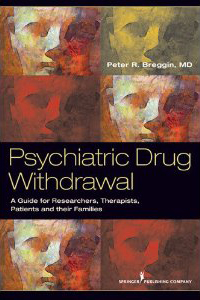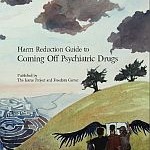A Guide for Prescribers, Therapists,
Review by Dr. Harriet Cooke, MD: An excellent resource for clients, families and clinicians to support the decision making process and efforts to minimize or withdraw from psychotropic medications. In his introduction, Dr. Breggin reviews the hazards of psychiatric drug withdrawal. Part I then looks at the reasons to consider psychiatric withdrawal or dose reduction. This section is organized by the different kinds of psychotropic medications. Part II then goes through the drug withdrawal process, reviewing: Withdrawal reactions from specific drugs and drug categories; The Initiation Evaluation; Development of team collaboration; Psychotherapy during medication withdrawal; Handling emotional crises; Techniques for beginning medication withdrawal; Cases of withdrawal; and Concluding thoughts for prescribers, therapists, patients and their families. An excellent resource from a psychiatrist in the field for well over three decades. My critique of the book is that the book does not include the use of nutrition therapies, or the newer cutting edge therapies of energy medicine and energy psychology, which can be powerful modulators of extreme emotional states.
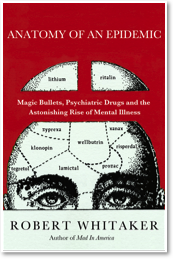 Anatomy of an Epidemic by Robert Whitaker
Anatomy of an Epidemic by Robert Whitaker
When Robert Whitaker (Mad in America, 2002) learned that between 1987 and 2007 the number of Americans disabled due to mental illness more than doubled despite a whopping $40 billion annual psychotropic drug tab, it gave him pause. Given their widespread use—greater than even that of cholesterol-lowering drugs—he had believed that psychopharmaceuticals were magic bullets, knocking mental illness out of the game, returning formerly disabled people to the ranks of productive citizens. But the deeper he probed into clinical studies in prestigious scientific journals, some dating back more than 50 years, the more he noticed a shocking anomaly. Psychiatric drugs have repeatedly been shown to worsen mental illness, to say nothing of the risks of liver damage, weight gain, elevated cholesterol and blood sugar, and reduced cognitive function they entail. The reality, he says, is that, because no one knows what causes mental illness, there’s no cure or palliation to be found in these pills. What with the conclusions Whitaker draws from his assembled literature and the accusations he levels at those who consciously deceive consumers eager for magical cures, his book will either blow the lid off a multibillion-dollar industry or cause him to be labeled a crackpot and, perhaps, medicated into obscurity. At the very least, it should prod those who take the drugs to question those who prescribe them. –Donna Chavez
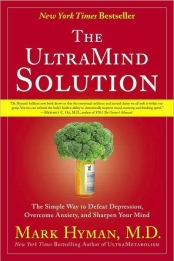 The UltraMind Solution by Mark Hyman
The UltraMind Solution by Mark Hyman
From his own account, stress and mercury poisoning transformed Lenox, Mass., physician Hyman (UltraMetabolism ) from a physical and mental titan to a depressed, anxious chronic fatigue sufferer. His journey to health included visits to a TCM (Traditional Chinese Medicine) practitioner and a Hawaiian naturopath. Here he cites the main culprits of his and other serious, now epidemic, conditions (mood disorders, Alzheimer’s disease, ADHD, autism, etc.): 21st-century lifestyles, dangerous environmental toxins and genetic liabilities. Hyman contends that psychiatrists and neurologists prescribe cognitive therapy and medication, but do not address the physical damage causing brain dysfunction. His program to balance seven key body systems consists of a gluten- and dairy-free diet; 30 minutes of daily walking and morning and evening self-care rituals. Quizzes help readers determine their weaknesses and whether to follow the basic plan, optimize it or seek medical intervention. Hyman thoroughly explains each body system; the impact of poor diet, stress and environment; the best foods and supplements; and ways to detoxify and activate the body’s own healing mechanisms. An online companion guide offers additional advice (for example, a more vigorous physical training regime, brain exercises and ways to ease detoxification side effects and constipation), as well as allergy-free recipes. – Publishers Weekly vol. 255 iss. 48 p. 43 (c) 12/01/2008
 Natural Healing for Schizophrenia & Other Common Mental Disorders: A Compendium of Nutritional Approaches by Eva Edelman
Natural Healing for Schizophrenia & Other Common Mental Disorders: A Compendium of Nutritional Approaches by Eva Edelman
Natural Healing for Schizophrenia & Other Common Mental Disorders is a state-of-the-art resource detailing natural treatments for schizophrenia and other mental and emotional disorders.
Natural treatments have been developed over the past half century by pioneering physicians, psychiatrists, psychologists, and biochemists; and represent an unprecedented breakthrough in the treatment of schizophrenia. These treatments have been found to lead to a 75 to 85% rate of recovery or great improvement, which is in stark contrast to expectations with mainstream methods. Natural treatments also do not produce the brain suppression and damage all too common in the conventional approach but, rather, tend to enhance the health of both brain and body.
Natural Healing for Schizophrenia should be of prime interest to patients and their families, as well as physicians and other health professionals searching for more effective treatments. Individuals interested in brain biochemistry and the influence of nutrients, toxins, and illness on brain functioning will also find this book valuable.
“Eva Edelman has compiled a magnificent and needed contribution to the field of mental health… Well-organized, clearly written, and comprehensive in scope, it will without doubt change the lives of the sufferers and families with mental illness… Should be required reading for psychiatrists, psychologists and other health professionals as well as for those planning medical school curriculum and national health policy… A superb work, a beacon of hope.” — Dr. Ralph Golan, MD
“An invaluable resource… enlightens us all in the medical profession, and will give great hope and comfort to patients.” — Dr. Oscar Rogers Kruesi, MD, FACP
“Could qualify as a textbook which should be required reading for every mental health professional. At the same time, this superb compendium contains a wide range of information which would benefit any non-professional interested in the biochemistry of behavior or just maintaining health.” — Dr. Hugh D. Riordan, MD
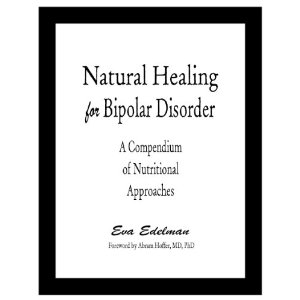 Natural Healing for Bipolar Disorder: A Compendium of Nutritional Approaches by Eva Edelman
Natural Healing for Bipolar Disorder: A Compendium of Nutritional Approaches by Eva Edelman
Natural Healing for Bipolar Disorder: A Compendium of Nutritional Approaches is a clear, comprehensive, and extensively documented resource. It provides an overview of stimulating, inhibitory, and stabilizing nutrients and herbs, and of nutrient approaches for contributory factors, including imbalanced brain chemistry (neurotransmitter, receptor, and second messenger issues; methylation status, oxidative stress, seizural problems, toxicity, etc.) and physical illness (e.g., allergies, malabsorption, Candida, endocrine imbalance). It has been highly acclaimed by key practitioners.
“Eva Edelman has completed another masterpiece, doing for bipolar disorder what she did for schizophrenia. It’s a classic work people will refer to for years to come, and a must-read for anyone interested at all in bipolar disorder.” — Michael Lesser, MD
“Every person who values his or her own health and the health of others should have the information you have gathered into such a useful volume. It just may save their lives.” — Abram Hoffer, PhD, MD
“The best book for informing patients (and their bewildered doctors) about the realities of bipolar disorder that I have read in my entire medical career… A magnificent sequel to her excellent book, Natural Healing for Schizophrenia.” — Bradford S. Weeks, MD
“The first comprehensive volume on nutritional approaches for bipolar disorder ever written… required reading for our research and medical staff.” — William J. Walsh, PhD

